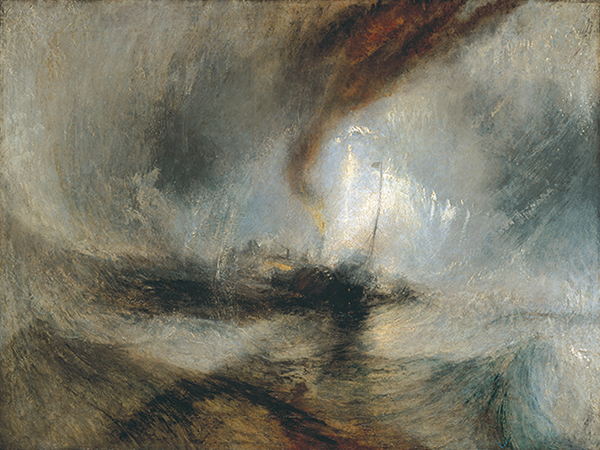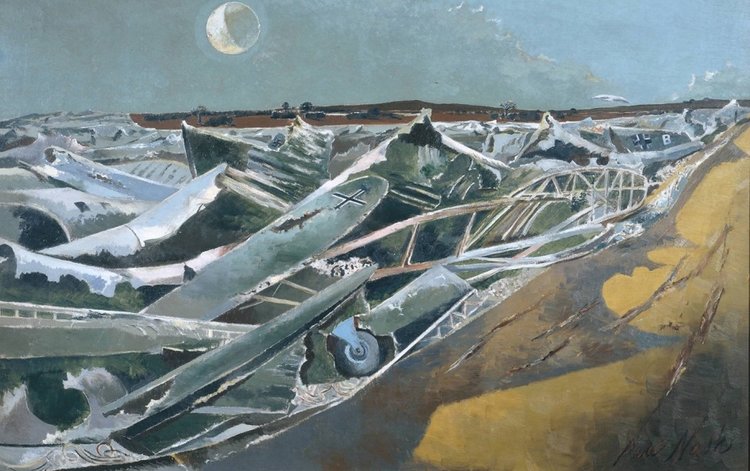Art Encounters | A Wave, a Dream and Dante
A few weeks ago, rumbling around in the garage, I came across a poster of the famous Japanese woodblock print (The Great Wave Off Kanagawa by Hokusai) that was given to me as a present by my sister and brother-in-law when they returned from a holiday in Japan. While looking at the print, I tried to remember having put it away, for safe keep, but couldn’t. It felt uncanny as I had only recently come across a much bigger version of the same poster – this time from the Art Institute of Chicago – hanging in the downstairs bathroom of my Dad’s house. The poster had been in the bathroom for some time, but I only really noticed it during the summer when I was helping to clear things from the house. I wondered what to do with it. For some reason this one picture bothered me. I liked the print, as so many do, but I really didn’t want the poster. And I didn’t know why. That night I went to bed but awoke an hour later having had the most vivid dream. It was such an intense and memorable dream I decided – for the first time ever – to write it out. Over the next few weeks, I worked on making the text legible for readers, while trying to figure out its significance. The following, something of a transcript, is what I’ve been left with.
The Wave
The yacht is moving through the sea at a rate of knots but water is pouring in from the sides. Flows of water fluctuate in trickles from all directions. Wind is powering in too, one minute from the West, the next the East, no pattern to the fluctuations. The boat is moving, as if in the midst of chaos it has its own will. It won’t be a pupil to the sea; it wants to be master. It must power forth. Three men and a young adult – perhaps a teenager – huddle around the tiller in congress, discussing how to navigate through the storm. One of the men breaks away and says something to the young adult; a bucket appears and they both begin to gather the water from the deck, frantically pushing it back into the sea. The bucket is lowered and lifted… Lowered and lifted… Lowered and lifted… Lowered and lifted… Each time the water that spills outwards is pushed back from the sea, stalls in midair, before doing a little dance as drops push in all directions. These little dances are part of a greater dance, waves gathering force and pushing the smaller ones away, as all sorts of rhythms interrupt and counteract each other. The light green-coloured yacht is still pushing into the meeting point of rock and water; powering on into the nothingness, or is it the everything of the sea… Nothingness… Everything… Nothingness. The face of the young adult, teenager, boy, cannot be seen clearly; he is like an automaton pushing water against the sea. Those others that make up the crew, as if oblivious to the danger all around, are huddled in conversation on deck; their shouting drowned out by the swirling willawol* winds; and the waves that push up against the boat now from all directions.

Rocks appear- arrows jutting out from the ocean mist, encased by seaweed. The seaweed clings to the rocks like jewelry hanging from a woman’s neck. The rocks are a sandy brown, the jewelry that ornaments them a beige yellow with dashes of green. It’s a subtle green, not unlike the purple haze across the Scottish Highlands. Water is pushing over these rocks, in thrall of its own power before falling away in suspicion of defeat, only to rise again minutes later. The yacht is passing between these rocks because a man, whose back is turned away from the rest of the crew, is standing at the front, holding the small sail that gives the yacht its direction. Unlike the others, he stands upright. It is as if the conditions are at his mercy. He is dressed in a thick white coat, padded out to conceal the actual size of his body, and his hair is subject to the swirling winds, flowing in all directions. In his right hand is the sail, with his left hand remaining free so that he can make hand signals to the sailors huddled together at the tiller. Between them, on the left, sits the boy.
Voices drown out in the screeching holler of Nature. In the midst of this, the yacht powers forward. It is hard to believe it move in this way because of human design and nature working in tandem. It cuts through the swathes of ocean like a knife cutting through butter, but there is no way of knowing where it is going, or why. As the boat powers forward at speed, it is also horizontal: as if it will tip over on its side at any moment. The boy is clinging to the upward side, holding his balance. He then begins to pour swathes of water that have gathered on deck back into the ocean. Suddenly, a gush of wind comes from nowhere, and unleashes one big soaring wave. The wave flows in over everything. Another gust of wind, a willawol, blows in the opposite direction to the main gust that has been powering the sail, and the boat tips over. Water now gushes in from everywhere. The froth of the sea, a white bubbly haze, covers over the gradually reducing green of the yacht. Now the heads of the crew, thrown overboard, can be seen bobbing up and down in the swelling sea. The boy is nowhere to be seen, nor is the man who stood at the front of the yacht.

I’m floating in the sea, and yet I don’t feel cold. I can’t see the boat in the distance – and so panic sets in. A wave cuts across another and pushes upwards dragging me with it. The ocean is devoid of pattern – there is a chaos that makes the gathering of perspective almost impossible. My feet are moving back and forwards in motion, propelled by the hope that some kind of ground will appear, and the ocean will become a shallow pool of water close to shore. But there is no shore here. There is only an ocean gathering energy and power as water pours into my mouth and my head is engulfed by waves. I can see the boat sail in the distance as I bobble in the water with only the premonition of my own death, the only thought I have had for hours crystalizing in the moment. I’m near paralyzed with fear, unable to move my hands in unison. But I know I must swim. The life jacket that keeps me buoyant is now more of a hindrance. As my head bobs up and down, I can make out the contours of the boat in the distance, and it gives me hope it can be resurrected from the sea. It fills me with desire. I try to swim. Suddenly I feel a hand on my mouth, and I turn around. Water splashes onto my face and salt runs into my eyes, blurring my vision. I struggle to make out the swimmer’s face. As things focus, I recognise it as my father, water spitting from his mouth, ‘I’ve taken off my lifejacket so I can swim properly. I’m going to bring you me with. Ok?’ he shouts from above water. ‘Your lifejacket will keep us buoyant.’ ‘Oh, thank God,’ I reply. ‘I didn’t know … I couldn’t see.’
Fear is replaced by something close to comfort, as I realize what is really happening. A hand now covers my mouth as we backstroke against the tide, and I feel we are somehow quelling the ocean’s power. I start to move the same legs that have toiled without intent for anything from five to twenty five minutes; In this swelling pool of life and death time has become meaningless. Here, in the Atlantic, there is only the moment and a future that life somehow clings to in abeyance. We move slowly, pushing with and against the ocean. My father spits out words, even when gasping for air, ‘We’ll get to the boat. Once a lifeguard…it never leaves you.’ I turn to push against his arm momentarily, unable to stay calm. I then see the boat, upright again; I feel relief. There is even greater relief as an oar is pushed in our direction on approaching the yacht. Water is being bucketed out as the sail flaps loudly in the wind. Pulled out of the water we sit side-by-side, breathing deeply for air as half wet blankets are also pushed in our direction. The sail is hoisted, and the boat moves forward again. A voice roars ‘the Gods have smiled on us but we have to dig in. We can make it to Roundstone in two hours, but it’s going to be hairy.’ I look around shivering, as a flask of tea makes its way to me. I think only of the Atlantic of which I am a small part; the waves all around a part of me.
Waking, I switch the light on. A battered copy of Dante’s Paradiso is beside my bed, almost staring up at me. I think of a quote I highlighted months ago when reading through the poem, and push frantically through the pages until I find it. It reads:
Beyond all boundaries, at memories undoing –
As when the dreamer sees and after the dream
The passion endures, imprinted on his being.
I smile as I read the quote aloud, and then fall back into a deep sleep. When I wake again, I think about writing it all out: the wave, a dream and Dante.
*an unexpected wind (Aran)
More from the Art Encounters series can be found here.
